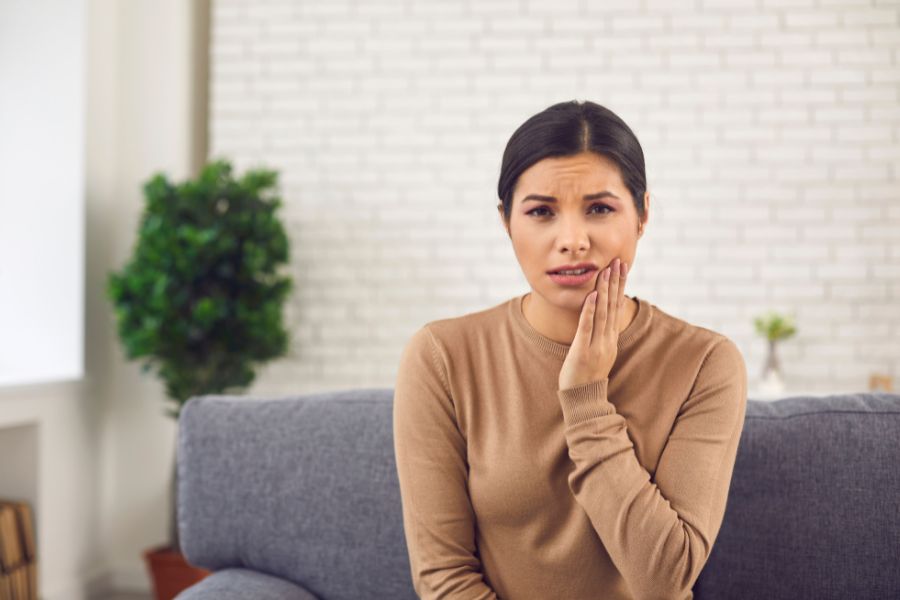Tooth extraction can be a pretty dental ordeal, leaving many coffee lovers wondering if they could still enjoy their favorite beverage while recovering.

It is advised to avoid consuming hot or cold coffee right after a tooth extraction to prevent any hindrance in the healing process.
Such consumption can lead to complications such as bleeding and inflammation. It is better to wait for a few days and consume room-temperature coffee. However, it is recommended to consult your dentist before doing so.
We’ll show you more in the following whether or not it’s safe to savor room-temperature coffee after tooth extraction and give tips for promoting healing in your mouth.
From hot liquids to decaf selections, discover the dos and don’ts of postoperative care and some dentist-approved alternatives that won’t interfere with your recovery.
Tooth Extraction And Its Aftercare
Tooth extraction is a common dental procedure that involves the removal of one or more teeth due to various reasons, such as decay, infection, overcrowding, or an impacted wisdom tooth.
The process typically entails numbing the area using local anesthesia and then gently rocking the tooth back and forth until it loosens and can be safely removed.
Aftercare instructions your dentist provides are essential for proper healing and preventing complications such as dry sockets or infection.
Some of these guidelines may include avoiding vigorous rinsing of your mouth for 24 hours after the procedure, not smoking, letting blood clots form naturally at the extraction site without disturbing them (spitting less), applying ice packs externally if necessary to manage to swell, and taking any prescribed pain medication accordingly.
In addition, it’s recommended to stick to soft foods that require minimal chewing during your recovery period.
Can You Drink Coffee After A Tooth Extraction?

It is a common question asked after tooth extraction, but drinking coffee is not recommended in the first few days following the surgery.
Risks Of Drinking Coffee After A Tooth Extraction
Coffee lovers may struggle to resist their favorite drink after tooth extraction. However, drinking coffee too soon after the procedure can pose some risks that could prolong the healing process.
For example, hot beverages like coffee can interfere with blood clotting and cause bleeding in the treated area. This could prolong the recovery period by days or even weeks.
Drinking hot or cold beverages immediately after dental surgery can be detrimental to your recovery process.
Instead of coffee, water is highly recommended during this time because it will help you stay hydrated without disrupting your healing process.
When Is It Safe To Drink Coffee?
After tooth extraction, avoiding coffee for at least a few days is generally recommended. Most dentists advise patients to only consume water and soft foods in the first few days following the surgery.
This allows time for the blood clot to form and stabilize, which is crucial for proper healing.
While it may be tempting to enjoy a cup of coffee as soon as possible, please listen to your dentist’s recommendations and wait until you are fully healed.
Caffeine can interfere with blood clotting, so even room temperature or cold coffee should be consumed cautiously.
Benefits Of Drinking Room-Temperature Coffee
While avoiding coffee after a tooth extraction is generally advisable, some people may still crave the taste and comfort of their go-to beverage. Fortunately, consuming room-temperature coffee can be a safer option than hot or cold beverages.
Room-temperature coffee will not cause sensitivity or damage to the surgical site. Reducing the risk of complications during the healing process.
However, caffeine can interfere with blood clotting and exacerbate pain and swelling. Sometimes, it’s best to check with your dentist when you should start consuming room-temperature beverages like coffee again after your tooth extraction procedure.
Beverages To Avoid After A Tooth Extraction
Avoid hot and cold beverages, carbonated drinks, and alcohol after tooth extraction, as they can hinder healing.
Hot And Cold Beverages
It is best to avoid hot and cold beverages, including coffee, after a tooth extraction. Drinking hot beverages like coffee can lead to inflammation and delay healing.
Conversely, consuming cold drinks can cause discomfort and interfere with blood clotting. It is recommended that patients only consume water for the first few days following the procedure to allow proper healing of the surgical site. As tempting as it may be, avoiding hot and cold drinks will promote faster healing in the long run.
Carbonated Beverages
While coffee may be a no-go after a tooth extraction, it’s not the only beverage to avoid. Carbonated drinks like soda or sparkling water should also be avoided during recovery.
The carbonation in these drinks can cause discomfort and even pain at the surgical site and increase the risk of a dry socket – a painful condition when the blood clot dislodges from the tooth socket.
Sticking to water or other bland, non-carbonated beverages during this time is best. If you’re looking for some flavor, add slices of fruit or herbs to your water for a refreshing twist without any added risks.
Alcohol
It is strongly recommended to avoid alcohol consumption after a tooth extraction. Alcohol can interfere with the healing process and also increase bleeding and swelling.
It can also lead to dry sockets and other complications. Most dentists advise their patients to wait at least 24 hours before consuming alcoholic beverages.
Instead of reaching for that bottle of beer or glass of wine, opt for water or room-temperature coffee as an alternative drink. These will keep you hydrated without interfering with your healing process and satisfy your thirst cravings.
Tips For Promoting Healing After A Tooth Extraction
Follow the postoperative instructions provided by your dentist, maintain good oral hygiene, and monitor for any complications to promote healing after tooth extraction.
Follow Postoperative Instructions
After tooth extraction, following the postoperative instructions provided by your dentist or oral surgeon is crucial.
This includes information on caring for the extraction site and avoiding certain foods and beverages, like coffee.
Postoperative instructions may include:
- Avoiding straws.
- Brushing gently around the extraction site.
- Using ice packs to reduce swelling.
To ensure optimal oral health, it’s crucial to adhere to the prescribed medication regimen and keep up with follow-up appointments with your dental care provider.
Maintain Good Oral Hygiene
Proper oral hygiene after tooth extraction is crucial to promote healing and prevent infection. You should avoid brushing around the extraction site during the first 24 hours after the procedure.
After that, gently brush your teeth twice daily with a soft-bristled toothbrush and fluoride toothpaste.
In addition to brushing and rinsing regularly, avoid smoking or using tobacco products, as they can slow down the healing process and increase your risk of developing an infection.
When recovering, it’s best to refrain from using straws for drinking as it may cause blood clots to move and prolong the healing process.
Monitor For Complications
After tooth extraction, monitoring for any potential complications should be kept in mind. While some discomfort and swelling are normal in the first few days after the procedure, excessive bleeding or severe pain may indicate an issue.
Other signs of complications include fever, difficulty breathing or swallowing, and pus or discharge from the extraction site. These symptoms could indicate an infection requiring prompt treatment to prevent further complications.
In general, it is essential to stay attentive to your body’s signals during the recovery period and seek professional help if you notice anything out of the ordinary.
Alternatives To Coffee
If you’re a coffee lover but can’t consume it after a tooth extraction, don’t worry. There are plenty of alternatives that won’t interfere with your recovery.
In the first few days following the surgery, it’s best to stick to soft foods and liquids like water, broth, or herbal tea without caffeine.
As your healing progresses and you feel more comfortable eating solid foods again, you can gradually introduce warm beverages like herbal tea or decaf coffee, as they have lower caffeine content than regular coffee.
void hot or cold drinks, which may irritate the surgical area and cause pain or bleeding. Stick to lukewarm options such as soups for faster healing.
FAQs
Can I Drink Decaf Coffee After A Tooth Extraction?
While decaf coffee may not have the same amount of caffeine as regular coffee, it is still best to avoid any type of coffee in the first few days following a tooth extraction.
Decaf coffee can still be acidic and irritate the sensitive area around the extracted tooth.
After a few days have passed, you may be able to slowly introduce warm, room-temperature beverages such as decaf tea or decaf coffee into your diet. However, it’s important to continue monitoring how your body reacts and follow your dentist’s recommendations.
Remember that everyone’s healing process is different, and there isn’t no clear answer for when to start drinking decaf coffee after tooth extraction.
When Can I Drink Tea After A Tooth Extraction?
Tea, just like coffee, contains caffeine and can interfere with the healing process after tooth extraction. Most dentists recommend that their patients avoid drinking tea for at least a few days after surgery.
Once you are past the first couple of days, it may be safe to gradually introduce warm tea into your diet. Sticking to lukewarm or room-temperature tea is best, as hot or cold temperatures can irritate your surgical site.
Additionally, make sure not to use a straw while consuming any drink, as this can dislodge blood clotting in your mouth.
How Should I Drink Room Temperature Coffee After A Tooth Extraction?
If you’re a coffee lover and must have your daily dose after tooth extraction, it’s best to stick with room-temperature coffee. However, even then, you should exercise caution when drinking coffee.
Sipping through a straw is not recommended, as sucking may cause dry sockets and delay healing. Instead, take small sips directly from the cup or use a spoon to sip slowly.
It’s also essential to avoid adding anything hot or cold to your room-temperature coffee, such as ice cubes or hot milk, that can disrupt the healing process by causing discomfort and irritation in the sensitive area around the extracted tooth.
Conclusion
In conclusion, it’s best to avoid coffee after a tooth extraction for at least a few days. Drinking hot or cold beverages can interfere with healing and cause complications.
While room-temperature coffee may seem an acceptable alternative, waiting until your dentist gives you the green light is still advisable. Follow their recommendations on when to start consuming warm liquids again to ensure proper healing and a speedy recovery.
Remember to prioritize oral hygiene, monitor postoperative symptoms, and seek medical attention if necessary.